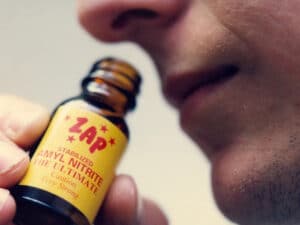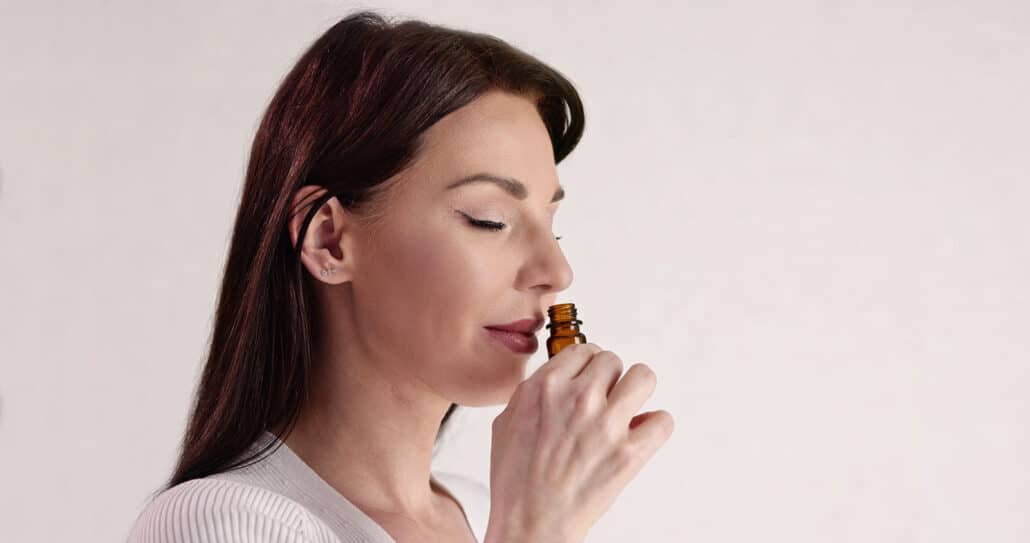Although there’s little regulation on the sale and usage of amyl nitrate poppers, there’s plenty of reason to avoid its usage.
According to the FDA, poppers can result in serious adverse effects that can lead to hospitalizations and deaths.
Today, we’ll discuss everything you should know about poppers. Find out how long poppers last and why they are dangerous.
Table of Contents
What Are Poppers?

Poppers, amyl nitrite, or butyl nitrite are vasodilators that cause blood vessels to widen. It increases blood flow, giving users a head rush.
The use of poppers began in 1867 as a medical treatment for angina pectoris or chest pain. This drug became widespread in parties in the 1970s.
During the time, poppers came in small bottles you had to pop open, hence the nickname.
Poppers and alkyl nitrites produce vapors that people inhale, often during intercourse. Its popularity grew in the LGBTQ community for its ability to relax muscle tissue and reduce pain.
Today, poppers are still sold in adult novelty stores as leather cleaners or nail polish removers. Studies show over 3.3% of adults in the US have taken the drug, making it the second most prevalent substance after marijuana.
Unfortunately, people may not realize the danger because of how stores market poppers. The public must become aware of the adverse side effects of this drug.
Why Are Poppers Dangerous? 8 Side Effects to Look Out For
Poppers are dangerous because of a wide range of side effects. Below are some issues that arise from the abuse of poppers.
1. Caustic Effects
Poppers are caustic to the skin, meaning they can damage flesh and cause a severe skin rash if you touch them.
It’s concerning that poppers come in misleading bottles. Some packagings label poppers as Jungle Juice, leading people to believe they’re meant to drink the substance.
Be aware that poppers aren’t energy drinks. If you accidentally ingest it, you’ll experience chemical burns in your throat. You should seek immediate medical attention if this happens!
2. Cancer
Doctors studied the effects of poppers on mice and found that exposure to isobutyl nitrate can lead to cancer.
Poppers accelerate the growth of subcutaneous tumors, altering the genes among test subjects.
3. Methemoglobinemia
Inhaling large amounts of poppers can lead to methemoglobinemia. This is a life-threatening condition that makes it hard to breathe.
Methemoglobinemia happens when there’s too much methemoglobin in your blood. The condition affects how your blood carries oxygen around your body, impacting your organs.
Nursing women should avoid using poppers since nitrites can transfer through breast milk. This may lead to methemoglobinemia in infants.
4. Heart Problems
Taking poppers can affect your heart rhythms. Since it lowers the oxygen in your blood, your heart rate increases to 100 beats per minute to compensate.
What’s more, inhaling poppers may lead to sudden sniffing death syndrome, where your heart stops beating.
Anyone can experience this side effect, not just long-time users. According to the University of South Florida, 22% of people who die from inhalant abuse were first-time users.
If you’re taking poppers, chest pain and dizziness are signs you’re in danger, and you should go to the ER immediately!
5. Eye Damage and Blindness
A lesser-known side effect of inhaling poppers is maculopathy, a disease that affects your retinas. Glaucoma, or optic nerve damage, is also possible.
Reports say that the volatile isopropyl nitrate in poppers causes eye damage soon after inhalation.
6. Increased Risk of HIV
One of the side effects of poppers is a rush of euphoria, affecting decision-making.
Research shows that using poppers impacts behaviors. It causes people to practice unsafe sex and has a direct association with HIV.
7. Lower Blood Pressure
Poppers can slow your blood flow and lower your blood pressure. It’s dangerous if you combine it with an erectile dysfunction medication like Viagra.
Since Viagra and poppers both lower blood pressure, they can interact and affect your body. You may even lose consciousness as your blood pressure drops.
8. Headache and Dizziness
Finally, poppers can also lead to headaches, dizziness, lightheadedness, and loss of consciousness.
The low oxygen supply and head rush from taking poppers make you more prone to accidents.

How Long Do Poppers Last?
When you inhale poppers, you’ll feel the effects within seconds. The euphoria from this drug only lasts a few minutes.
The exact time the high lasts varies from person to person, depending on metabolism and body size. Different brands of poppers may also have varying durations.
Regardless, you may notice skin rash, weakness, nausea, or visual changes after two to four sniffs. Your face and neck may flush, and you start to feel restless, sweaty, and cold.
| Aspect | Description |
|---|---|
| Onset of Effects | You’ll feel the effects within seconds after inhaling. |
| Duration of Euphoria | The euphoria lasts only a few minutes. |
| Variation Factors | The exact duration varies by individual (metabolism, body size) and brand of poppers. |
| Possible Symptoms | – Skin rash |
| – Weakness | |
| – Nausea | |
| – Visual changes | |
| Physical Reactions | – Flushed face and neck |
| – Restlessness | |
| – Sweating | |
| – Feeling cold | |
| Number of Sniffs for Symptoms | Symptoms may appear after two to four sniffs. |
Poppers Detection Times
| Test Type | Detection Window | Notes |
| Urine | Up to 72 hours | Traces of poppers can be detected in urine for up to 72 hours after use. |
| Blood | 12 to 24 hours | Poppers are typically undetectable in blood after 12 to 24 hours. |
What Are the Long-Term Effects of Poppers?
Some of the long-term effects of poppers include brain damage and a weakened immune system. You’ll have a higher risk of cancer, and you may experience loss of vision.
Moreover, the caustic effects of the vapors from poppers can damage your lungs. You may develop bronchitis, which leads to excess mucus production and chronic coughing.
Can You Get Addicted to Poppers?
Poppers are not as addictive as TNT and other illegal substances. However, people can develop a tolerance, which causes them to increase the dosage. As a result, they may overdose and lose consciousness.
Even though there’s a low risk of dependence when you’re taking poppers, it can still have harmful effects on your health.
If you or a loved one are misusing inhalants, please consider seeking professional help.
Are Poppers Legal?
You can’t sell poppers in the US as a recreational drug. Still, some people can legally sell them by marketing them as a cleaning solution, deodorizer, or nail polish remover.
The FDA says these products aren’t approved and must not be inhaled or ingested. It continues to investigate popper death cases and take appropriate actions to protect public health.
If you accidentally consume poppers, here’s what you can do.
- Be Aware of Health Risks: Be aware that poppers can cause serious injury and death. You should stop usage and discard the product immediately.
- Consult Your Doctor: Those experiencing side effects from poppers should seek medical help.
- Report to the FDA: Consider reporting any adverse effects to the FDA. Doing so can help with its investigation of poppers.

How Can You Recover From the Abuse of Poppers?
Using poppers can have negative impacts on your health, work, and relationships. If you’re struggling with inhalant abuse, you can reach out to a loved one for support.
Don’t worry. Poppers aren’t as addictive as other drugs. You may experience withdrawal symptoms, but you can recover with professional help and a little effort.
Here are effective ways to treat popper substance abuse.
1. Psychotherapy
Those who abuse nitrite inhalants over a prolonged period may find it hard to break the habit. In this case, psychotherapy can assist you in overcoming mental challenges.
Psychotherapy involves various talk therapies and activities. You can even join fun programs that introduce you to new social groups!
Through psychotherapy, you’ll learn how to function better and rediscover how to cope with stressful events. Moreover, you can better address withdrawal symptoms like anxiety, altered moods, and irritability.
2. Cognitive Behavioral Therapy
Cognitive behavioral therapy is a type of therapy where you share your emotions and ideas with a counselor. This professional will then analyze your thoughts and give you logical feedback.
CBT is a guided conversation that allows you to understand your behaviors. Through it, you’ll recognize unhealthy thoughts and find out how to diffuse internal triggers.
3. Group Therapy
Overcoming an addiction is easier if you have assistance from friends or family. For this reason, group therapy may be beneficial for people struggling with inhalant abuse.
Group therapy involves guided discussions with others experiencing the same struggles. In some cases, you may even have talks with your family and with support groups.
4. Motivational Therapy
Motivational therapy is a type of therapy that gives you the drive to change destructive behavior. It can inspire you to stop the abuse and start living a happy life!
During motivational therapy, you’ll learn how to acknowledge reality and avoid arguments. You become more capable of recognizing your strengths.
5. Residential Treatment
For more serious cases of inhalant abuse, residential treatment may be a better option.
In residential treatment, you’ll live in a home and receive supervision from healthcare professionals. The goal of this type of treatment is to stop you from using poppers for recreational use.
Residential treatment can protect you from destructive behaviors and provide you with a support group.

Conclusion
Poppers are substances that can give you a few minutes of euphoria. Yet, the repercussions of inhaling this drug can last a lifetime.
What makes poppers so dangerous is the lack of information people have before trying them. Manufacturers may disguise them as beverages, which can have fatal consequences.
If you or a loved one experiences any side effects from poppers, it’s best to seek medical treatment immediately.
Finally, don’t be afraid to reach out to get help in overcoming popper inhalant abuse!
Published on: 2024-07-05
Updated on: 2025-03-28

